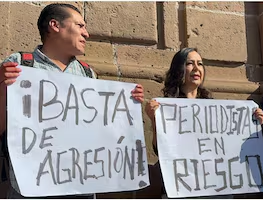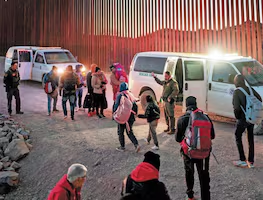Más Información

Captan a Luis Videgaray en Washington previo a toma de protesta de Trump; reaparece en cena exclusiva del equipo del Presidente

Condena la ONU-DH asesinatos del periodista Calletano de Jesús y del defensor Sergio Cruz; exige investigaciones

Fernández Noroña rechaza declaración de Trump sobre cárteles mexicanos; “inaceptable una invasión militar”, afirma

“Irreal que vayan a deportar a millones de personas”; experta afirma que EU carece de recursos y sistema para enfrentarla

PRI y PAN exigen a Sheinbaum “postura firme” ante Trump; destacan apoyo a migrantes y una América del Norte más integrada

Legisladores de Morena y oposición reprueban acciones de Trump contra migrantes; llaman a la unidad nacional
The director of Mexico’s National Institute of Anthropology and History (INAH) , Diego Prieto , informed that there were archeological remains near the Santa Lucía airbase , which President López Obrador plans to expand and turn into a civilian airport. This after scouting the area with a team of experts.
However, the social anthropologist from the National College of Anthropology and History did not reveal the results of the inspection, though he did propose a few actions to prevent damage to Mexico’s cultural heritage.
“There are remains everywhere. We’ve already conducted a few tours. We will be in charge of prospecting and investigate the sites. The fact that there are historic remains does not mean that a project of this magnitude cannot be undertaken, it just means that we need to promote an archeological rescue before construction begins,” he said.
“If the remains are movable objects such as vases, obsidian materials, or camp remains, we need to rescue, recover, and study them in a lab. If there are structures that, due to their nature, are better left unmoved, we should find a way to rescue them on site. If this entails a few modifications to the airport project, so be it. We are not against public works, all we ask is for the government to recognize the importance of protecting our heritage and history,” he claimed.
Prieto spoke about the airport terrain at the end of a session to commemorate the 80th anniversary of Mexico’s INAH in the Chamber of Deputies , where he commented that the institute was working on a protocol to rescue archeological remains in Santa Lucía.
Regarding the culture that the remains belonged to, Diego Prieto preferred not to specify an ethnic group yet, though he said that they might be Tlahuicas, Mexicas, Otomí, or even some more ancient groups such as the Teotihuacans or Tlalicas.
“There could also be remains that date back to pre-historic nomad groups. We don’t know yet. That’s what archeology is for,” he stated.
dm





